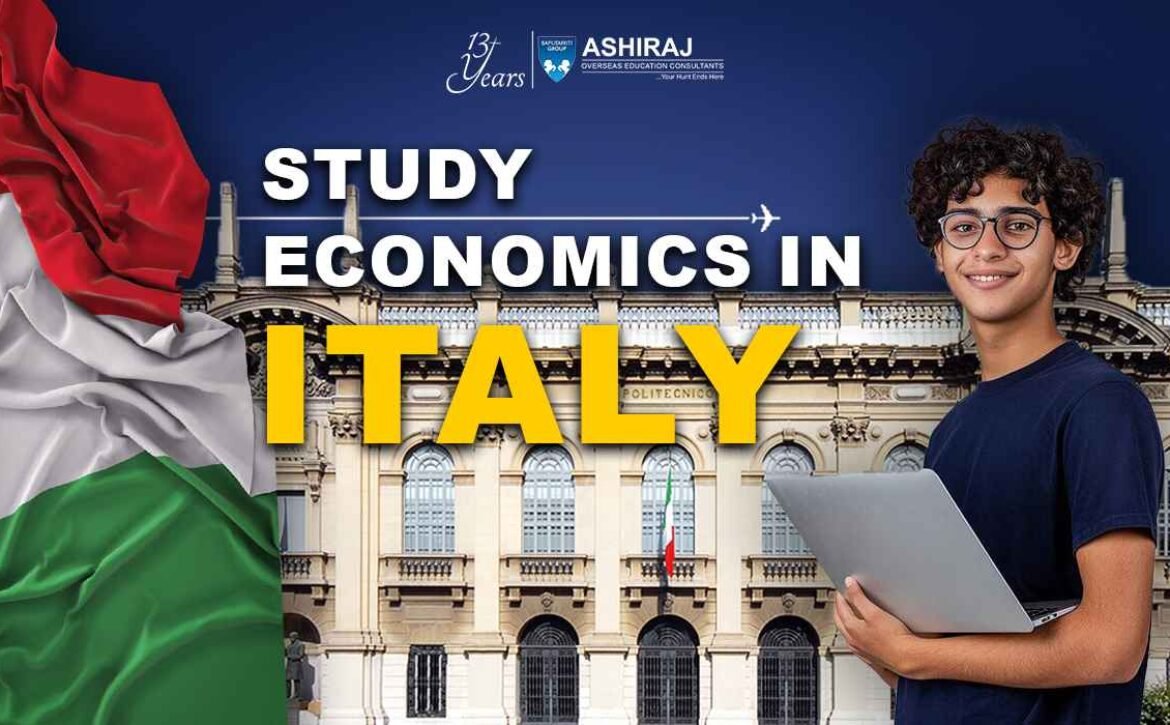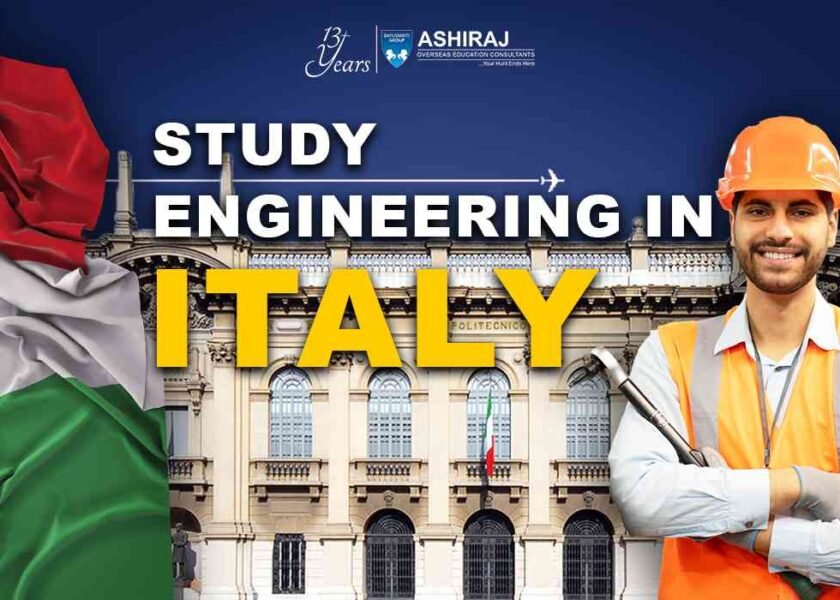
Economics in Italy
Italy, a nation celebrated for its rich cultural heritage, also boasts a diverse economic landscape shaped by centuries of historical influence. Economics in Italy is a compelling tapestry woven with threads of tradition and modernity. From the bustling markets of Rome to the innovative tech hubs of Milan, Italy showcases a dynamic economy characterized by innovation and resilience.
The Italian economy, deeply rooted in sectors like fashion, automotive, and manufacturing, has also embraced the digital age with fervor, positioning itself as a prominent player in the Information Technology (IT) sector. underscores the significance of understanding the intricate interplay between tradition and innovation in shaping Italy’s economic landscape. From traditional artisanal craftsmanship to cutting-edge technological advancements, Italy’s economy embodies a fascinating blend of old-world charm and contemporary dynamism.
Why to Study Economics in Italy?
- Rich Cultural Context: Studying economics in Italy provides a unique opportunity to immerse oneself in a country rich in history, art, and culture. Understanding the economic dynamics within such a context offers invaluable insights into global economic systems.
- Innovation and Tradition: Italy’s economy seamlessly integrates traditional industries like fashion, automotive, and manufacturing with modern advancements in technology and innovation. This blend offers students a comprehensive understanding of both old and new economic paradigms.
- Vibrant Academic Environment: Italian universities offer a vibrant academic environment with world-class faculty and cutting-edge research opportunities. Students studying economics benefit from a diverse range of perspectives and interdisciplinary approaches.
- Strategic Location: Italy’s strategic location in Europe makes it a gateway to both European and global markets. Studying economics here provides students with firsthand exposure to international trade, finance, and policy dynamics.
- Networking Opportunities: Italy’s business-friendly environment fosters networking opportunities with industry leaders, entrepreneurs, and policymakers. Building connections in Italy can open doors to exciting career prospects in various sectors, including finance, consulting, and technology.
Emphasizes the unique advantages of studying economics in this culturally rich and economically dynamic country.
Top Universities to Study Economics in Italy
University | QS World University Ranking 2023 | Type of University | Average Annual Fees | Programs Offered |
Bocconi University | 1st | Private | €15,000 – €20,000 | Economics, Finance, Business Administration |
University of Padua | 2nd | Public | €1,000 – €3,000 | Economics, International Relations, Statistics |
University of Bologna | 3rd | Public | €1,000 – €3,000 | Economics, Political Science, Law |
Sapienza University of Rome | 4th | Public | €1,000 – €3,000 | Economics, Business Management, Accounting |
Polytechnic University of Milan | 5th | Public | €1,000 – €3,000 | Economics, Engineering, Computer Science |
In the pursuit of an economics degree in Italy, students have access to world-class institutions renowned for their academic excellence and diverse programs. The table presents the top 5 universities in Italy for economics based on the QS World University Rankings 2023, offering insights into their rankings, type, average annual fees, and programs offered. emphasizes the focus of these institutions on economics education within the Italian academic landscape. From Bocconi University’s prestigious private education to the University of Padua’s affordable public programs, students have a range of options to suit their academic and financial needs. Whether pursuing economics, finance, or related fields, these universities provide a solid foundation for students aspiring to excel in the dynamic world of economics in Italy.
Course Curriculum for Economics in Italy
- Core Concepts: Economics in Italy curriculum covers fundamental economic theories and principles, including microeconomics, macroeconomics, and econometrics, providing students with a solid theoretical foundation.
- Specialized Tracks: Students can choose from various specialized tracks such as international economics, development economics, and financial economics, allowing them to tailor their studies to their interests and career goals.
- Interdisciplinary Approach: Many programs incorporate interdisciplinary perspectives, integrating topics from related fields such as political science, sociology, and business studies, enhancing students’ understanding of real-world economic issues.
- Research Opportunities: Students often have the opportunity to engage in research projects, working closely with faculty members on topics ranging from economic policy analysis to empirical research, gaining valuable hands-on experience.
- Practical Skills Development: Economics programs in Italy emphasize the development of practical skills such as data analysis, critical thinking, and problem-solving, preparing students for diverse career paths in academia, government, and the private sector. underscores the focus of these programs on providing a comprehensive education in economics within the Italian academic context.
Eligibility Criteria & Admission Requirements for MS in Economics in Italy
- Language Proficiency: Applicants must demonstrate proficiency in English through standardized tests such as IELTS or TOEFL. Scores typically range from 6.5 to 7.5 for IELTS and 80 to 100 for TOEFL. emphasizes the importance of language proficiency for international students.
- Standardized Tests: Depending on the university and program, applicants may need to submit scores for either GRE or GMAT. GRE scores usually range from 310 to 330, while GMAT scores range from 600 to 700. These scores assess applicants’ aptitude for graduate-level studies in economics.
- Academic Credentials: Students must provide proof of their academic qualifications, including transcripts and certificates from previous educational institutions. These documents demonstrate the applicant’s academic background and readiness for advanced studies in economics.
- Work Experience: Some programs may require or prefer applicants to have relevant work experience in economics or related fields. This experience can enhance the applicant’s understanding of economic concepts and their practical application in professional settings.
Test | Minimum Score |
IELTS | 6.5 – 7.5 |
TOEFL | 80 – 100 |
GRE | 310 – 330 |
GMAT | 600 – 700 |
- Passport & Student Visa: International students must possess a valid passport and obtain a student visa to study in Italy. The visa application process may require additional documentation, such as proof of financial means and acceptance letters from universities.
- Academic Certificates: Applicants must submit authenticated copies of their academic certificates, including diplomas and transcripts, to verify their educational qualifications.
- Work Experience: While not always mandatory, relevant work experience in economics or related fields can strengthen an applicant’s profile and increase their chances of admission to competitive programs in Italy.
Documents Required for Studying Economics in Italy
- Passport: A valid passport is essential for international students applying to study economics in Italy. It serves as identification and is required for visa application and enrollment.
- Letters of Recommendation (LOR): Typically, applicants need two letters of recommendation from academic or professional sources attesting to their qualifications, skills, and suitability for the program. These letters provide insight into the applicant’s character and abilities.
- Statement of Purpose (SOP): The SOP outlines the applicant’s academic and career goals, reasons for choosing economics in Italy, and how the program aligns with their aspirations. It offers a glimpse into the applicant’s motivations and aspirations.
- Curriculum Vitae (CV): A comprehensive CV highlights the applicant’s academic achievements, work experience, extracurricular activities, and relevant skills. It provides a snapshot of the applicant’s background and accomplishments.
- Official Transcripts and Educational Certificates: Applicants must submit official transcripts and certificates from high school and any post-secondary institutions attended. These documents verify the applicant’s academic credentials and qualifications.
- Work Experience Certificate: If applicable, applicants should provide a work experience certificate detailing their professional experience in economics or related fields. This certificate demonstrates the applicant’s practical knowledge and expertise.
- Proof of Financial Resources: To obtain a student visa, applicants must demonstrate sufficient financial means to cover tuition fees, living expenses, and other costs while studying in Italy. Proof of financial resources may include bank statements, sponsorship letters, or scholarship awards.
underscores the specific requirements and procedures involved in applying for economics programs in Italy.
Admission Process for Economics in Italy
- Research Programs: Explore economics programs offered by universities in Italy, considering factors such as curriculum, faculty, and campus location. Identify institutions that align with your academic and career goals.
- Review Eligibility Criteria: Check the admission requirements for each program, including academic qualifications, language proficiency tests (such as IELTS or TOEFL), and standardized tests (GRE or GMAT). Ensure you meet the minimum criteria for application.
- Prepare Required Documents: Gather necessary documents, including passport, letters of recommendation, statement of purpose, curriculum vitae, official transcripts, educational certificates, work experience certificate (if applicable), and proof of financial resources.
- Submit Online Application: Complete the online application form for your chosen economics program, providing accurate personal and academic information. Attach required documents as specified by the university.
- Pay Application Fees: Some universities may require payment of application fees. Ensure timely payment to complete the application process.
- Await Admission Decision: After submitting your application, wait for the university to review your materials. Admission decisions typically take several weeks to months, depending on the institution.
- Obtain Student Visa: If accepted, follow instructions provided by the university to obtain a student visa for studying in Italy. Prepare additional documentation as required by the Italian consulate or embassy.
- Enroll in Program: Upon receiving your student visa, finalize enrollment procedures with the university. Attend orientation sessions and prepare for the start of your economics program.
emphasizes the focus of the admission process on pursuing economics education within the Italian academic context.
“Education is the most powerful weapon which you can use to change the world.”
Nelson Mandela
Cost of Economics Course in Italy
- Tuition Fees: The cost of tuition for economics programs in Italy varies depending on the university, program level, and whether it’s a public or private institution. On average, tuition fees range from €1,000 to €20,000 per year.
- Living Expenses: Students should budget for living expenses, including accommodation, food, transportation, and personal expenses. Costs can vary depending on the city and lifestyle, with major cities like Rome and Milan generally being more expensive than smaller towns.
- Scholarships and Financial Aid: Many universities in Italy offer scholarships and financial aid to international students based on academic merit, financial need, or other criteria. Applicants should explore scholarship opportunities and apply for financial assistance where available.
- Part-time Work: International students in Italy are permitted to work part-time during their studies to supplement their income. However, it’s essential to balance work commitments with academic responsibilities.
- Healthcare and Insurance: Students may need to purchase health insurance coverage while studying in Italy, either through the Italian healthcare system or private insurance providers.
- Additional Costs: Other expenses to consider include visa fees, travel costs, books, and study materials.
highlights the specific focus on the costs associated with pursuing economics education within the Italian academic landscape.
Scholarships for Economics Courses in Italy
Scholarship Name | Amount | Application Deadline | Eligibility Criteria |
Bocconi Merit Awards | Up to €12,000 per year | April 15 | Based on academic merit and financial need |
Italian Government Scholarships | Varies | Varies | Open to international students pursuing degrees in Italy |
University-specific Scholarships | Varies | Varies | Offered by individual universities, based on various criteria |
Erasmus+ Scholarships | Varies | Varies | Available for students from EU/EEA countries participating in Erasmus+ programs |
Scholarships provide valuable financial support for international students pursuing economics education in Italy. underscores the focus on scholarships specifically tailored for studying economics within the Italian academic context. The table presents various scholarships available for economics students, including the amount offered, application deadlines, and eligibility criteria. From Bocconi Merit Awards recognizing academic excellence to Italian Government Scholarships open to international students, these opportunities aim to make economics education in Italy more accessible and affordable. Applicants should carefully review eligibility criteria and deadlines for each scholarship and submit their applications accordingly.
Career Opportunities After Economics in Italy
Job Profile | Average Salary (EUR) |
Economist | €35,000 – €60,000 |
Financial Analyst | €30,000 – €50,000 |
Policy Analyst | €30,000 – €55,000 |
Investment Banker | €40,000 – €80,000 |
Data Analyst | €25,000 – €45,000 |
Economics graduates in Italy have access to diverse career opportunities across various sectors, reflecting the versatility of their skills and knowledge. emphasizes the focus on career prospects specifically within the Italian job market. The table showcases common job profiles for economics graduates along with their average salaries. From roles as economists conducting research and analysis to financial analysts assessing market trends, there are ample opportunities for graduates to apply their economic expertise. Policy analysts contribute to shaping public policies, while investment bankers facilitate financial transactions and investments. Data analysts play a crucial role in interpreting and utilizing data for informed decision-making. With competitive salaries and opportunities for growth, a degree in economics opens doors to rewarding careers in Italy’s dynamic economic landscape.
Frequently Asked Questions About Economics in Italy
Some of the top universities in Italy for studying economics include Bocconi University, University of Padua, University of Bologna, Sapienza University of Rome, and Polytechnic University of Milan.
The average tuition fee for economics programs in Italy varies depending on the university and program level but typically ranges from €1,000 to €20,000 per year.
Yes, there are scholarships available for international students studying economics in Italy, including Bocconi Merit Awards, Italian Government Scholarships, and university-specific scholarships.
The eligibility criteria typically include academic qualifications, language proficiency tests (such as IELTS or TOEFL), standardized tests (GRE or GMAT), and submission of required documents like transcripts and letters of recommendation.
Graduates of economics programs in Italy can pursue various career paths, including roles as economists, financial analysts, policy analysts, investment bankers, and data analysts, with average salaries ranging from €25,000 to €80,000 per year.
While work experience is not always mandatory, some programs may prefer or require applicants to have relevant work experience in economics or related fields.
The application deadlines for economics programs in Italy vary depending on the university and program. It’s essential to check the specific deadlines for each institution.
Yes, many universities in Italy offer economics programs taught in English to cater to international students. Prospective students can explore English-taught options to pursue their studies in Italy.
Yes, international students in Italy are permitted to work part-time during their studies to supplement their income. However, it’s essential to balance work commitments with academic responsibilities.
The typical documents required for applying to economics programs in Italy include a valid passport, letters of recommendation, statement of purpose, curriculum vitae, official transcripts, educational certificates, work experience certificate (if applicable), and proof of financial resources.




